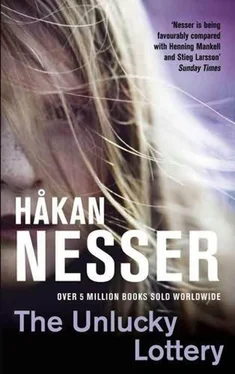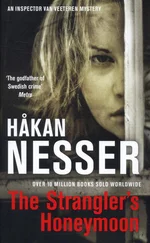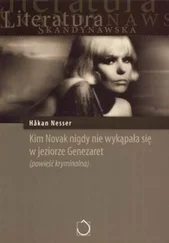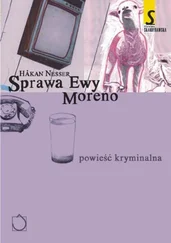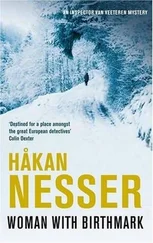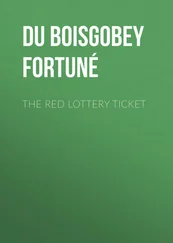‘I understand that you’re not in good shape,’ he said. ‘I’ll soon be leaving you in peace. But do you remember the de Grooit family or Lene Bauer?’
‘Who?’
‘Lene. She was called Gruijtsen in those days. You sometimes went on holiday together. In the sixties.’
‘Ah, Lene! Good Lord, I was only a kid then. She spent most of the time with Ruth.’
‘And that episode in the shed – no doubt you remember that?’
‘What bloody shed?’ asked Mauritz Leverkuhn.
‘When you hid there instead of going to school.’
Mauritz took two deep, wheezing breaths.
‘I haven’t a clue what you’re on about,’ he said. ‘Not a bloody clue.’
Münster checked into a hotel down by the harbour which seemed about as run-down as he felt. Showered, then dined in the restaurant in the company of two decrepit old ladies and a few members of a handball team from Oslo. Then he returned to his room and made two phone calls.
The first was to Synn and Marieke (Bart was not at home, as it was a Wednesday and hence film club at school). Marieke was being visited by a girlfriend who would be sleeping over, and hence only had time to ask him what time he’d be coming home. He spoke to his wife for one and a half minutes.
Then Moreno. It lasted nearly half an hour, and of course that said quite a lot in itself. She informed him about the new plastic carrier bag in Weyler’s Woods, and the ongoing investigation into the scrap of newspaper; but most of the time they talked about other things.
Afterwards he couldn’t really remember what. He spent an hour watching three different films on the television, then showered again and went to bed. It was only eleven o’clock, but he was still awake when the clocks struck two.
Thursday, 8 January was a comparatively fine day in Maardam. No sun, certainly, but on the other hand no rain – apart from a couple of hesitant drops just before dawn. And a good five degrees above freezing.
Quite bearable, in other words; and there was also a feeling of cautious optimism and a belief in the future about continued efforts to throw light on the Leverkuhn case.
The Leverkuhn-Van Eck-Bonger case.
Reports from the Forensic Chemistry Lab were arriving in quick succession, but today both Reinhart and Rooth were content to follow developments by telephone. They didn’t want to suck up too much to Intendent Mulder after all, and they did have other business to attend to…
The first message arrived at ten o’clock. New analyses of the typeface and paper showed that in all probability the Van Eck strip of paper had come from one of two publications.
Finanzpoost or Breuwerblatt .
It took Ewa Moreno five seconds to hit upon the possible link with the Leverkuhns.
Pixner’s. Waldemar Leverkuhn had worked – for how long was it? Ten years? – at the Pixner Brewery, and the Breuwerblatt must surely be a magazine for people connected with the beer industry. There was no reason to assume that a subscription would cease when a worker retired.
‘Leverkuhn,’ said Moreno when she, Reinhart, Rooth and Jung gathered for a run-through in Reinhart’s office. ‘It comes from the Leverkuhns, I’d bet my reputation on it!’
‘Steady on,’ said Reinhart, enveloping her in a cloud of tobacco smoke. ‘We mustn’t jump to conclusions, as they say in Hollywood.’
‘Your reputation?’ said Jung.
‘Metaphorically speaking,’ said Moreno.
After a few productive telephone calls they had discovered all they needed to know about both magazines. Finanzpoost was very much a business publication with financial analyses, stock exchange reports, tax advice and speculation tips. Circulation 125,000. Came out once a week, and was sold to subscribers and also over the counter. Number of subscribers in Maardam: over 10,000.
‘Bloody bourgeois rag,’ said Reinhart.
‘For the bastards who decide the fate of the world,’ said Rooth.
Breuwerblatt was rather a different kettle of fish. It was published only four times a year, and was a sort of trade journal for brewery workers in the whole country. Print run last year: 16,500. No over-the-counter sales. Distribution in Maardam: 1,260. One of the subscribers was Waldemar Leverkuhn.
‘One thousand two hundred and sixty!’ exclaimed Rooth. ‘How the hell can there be so many brewery workers in Maardam?’
‘How many beers do you drink a week?’ wondered Jung.
‘Ah, well, yes, if you look at it like that, of course,’ said Rooth.
It was agreed unanimously to put the bankers on the shelf for now, and concentrate instead on the much more respectable producers of beer; but before they could even start there was a knock on the door and an overweight linguist by the name of Winckelhübe – a specialist in semiotics and text analysis – entered the room. Reinhart recalled contacting Maardam University the previous evening, and welcomed Winckelhübe somewhat reluctantly. He explained the situation in broad outline, gave him a photocopy of the magazine extract, a room to himself, and a request to deliver a report as soon as he thought he had anything useful to say.
While Reinhart was busy doing this, Moreno contacted the editorial office of Breuwerblatt , which luckily was located in nearby Löhr, and after a typically efficient visit by young Krause, half an hour later they had two copies of each of the last three years’ issues lying on the table.
‘Good God!’ said Rooth. ‘This is going like clockwork. We’ve barely got time to eat.’
And it was Rooth who found the right page.
‘Here we are!’ he yelled. ‘Three bloody cheers!’
‘Altho’ a poor blind boy…’ said Reinhart. He went over to Rooth to check.
No doubt about it. The little strip of paper sticking out of Else Van Eck’s bottom in Weyler’s Woods came from the September issue of the previous year’s Breuwerblatt . Pages eleven and twelve. At the top on the left – a two-column announcement about a working environment conference in Oostwerdingen. The picture on the reverse side was part of a table and a suit belonging to the county governor who was officially opening a new brewery in Aarlach.
‘This is pretty clear,’ said Reinhart.
‘Crystal clear,’ said Moreno.
‘It’s obvious he has cirrhosis of the liver,’ said Rooth, examining the governor close up.
There followed a few seconds of silence.
‘Did you say there were twelve hundred and sixty subscribers?’ asked Jung. ‘So it doesn’t necessarily-’
‘Don’t be such a bloody prophet of doom!’ said Rooth. ‘Of course it’s from the Leverkuhns. So she’s done in the old lady Van Eck as well, I’d stake my damned… house on it.’
‘Metaphorically speaking?’ asked Moreno.
‘Literally,’ said Rooth.
Reinhart cleared his throat.
‘The evidence seems to suggest it might be from the Leverkuhns,’ he said. ‘In any case, shouldn’t we order some coffee and discuss the matter in somewhat more formal circumstances?’
‘I’m with you there,’ said Rooth.
During the coffee session another report arrived from the Forensic Chemistry Lab, and Reinhart had the pleasant task of informing Intendent Mulder that they were already dealing with the matter.
Since it was rather urgent. In the unlikely event of there being other things to attend to at the lab, there was nothing now to prevent them from getting on with them.
‘I understand,’ said Mulder, and hung up.
Reinhart did the same, lit his pipe and smiled grimly.
‘So, where were we?’ he said, looking round the table.
‘Oh, bugger!’ said Inspector Moreno.
‘There speaks a real lady,’ said Rooth.
Читать дальше
